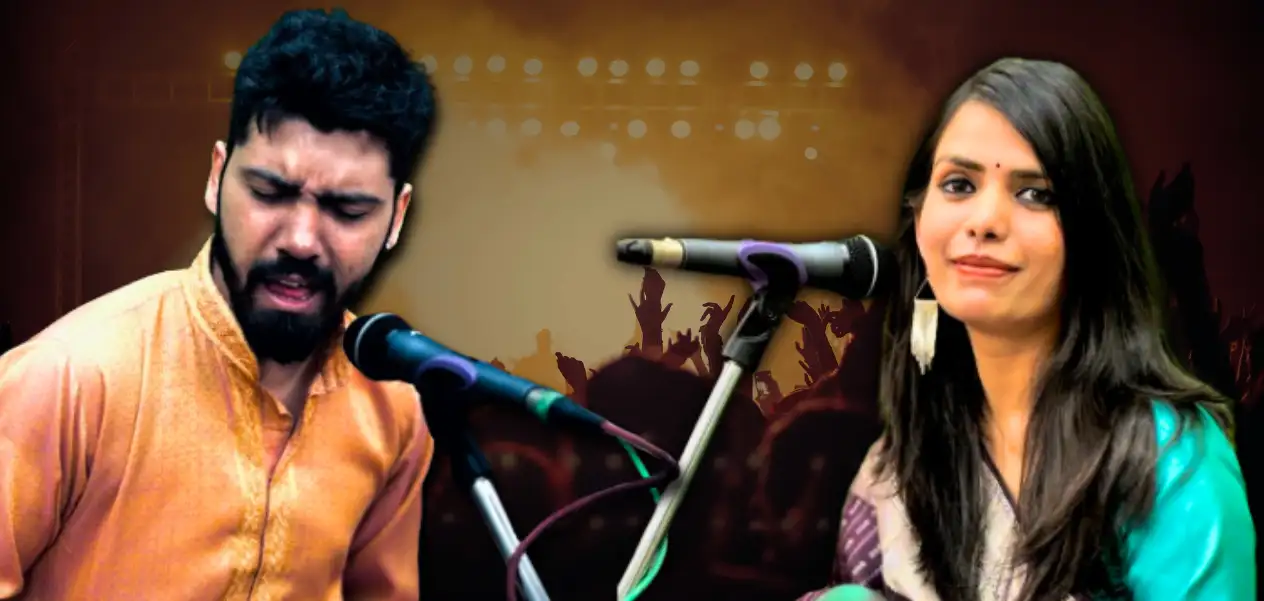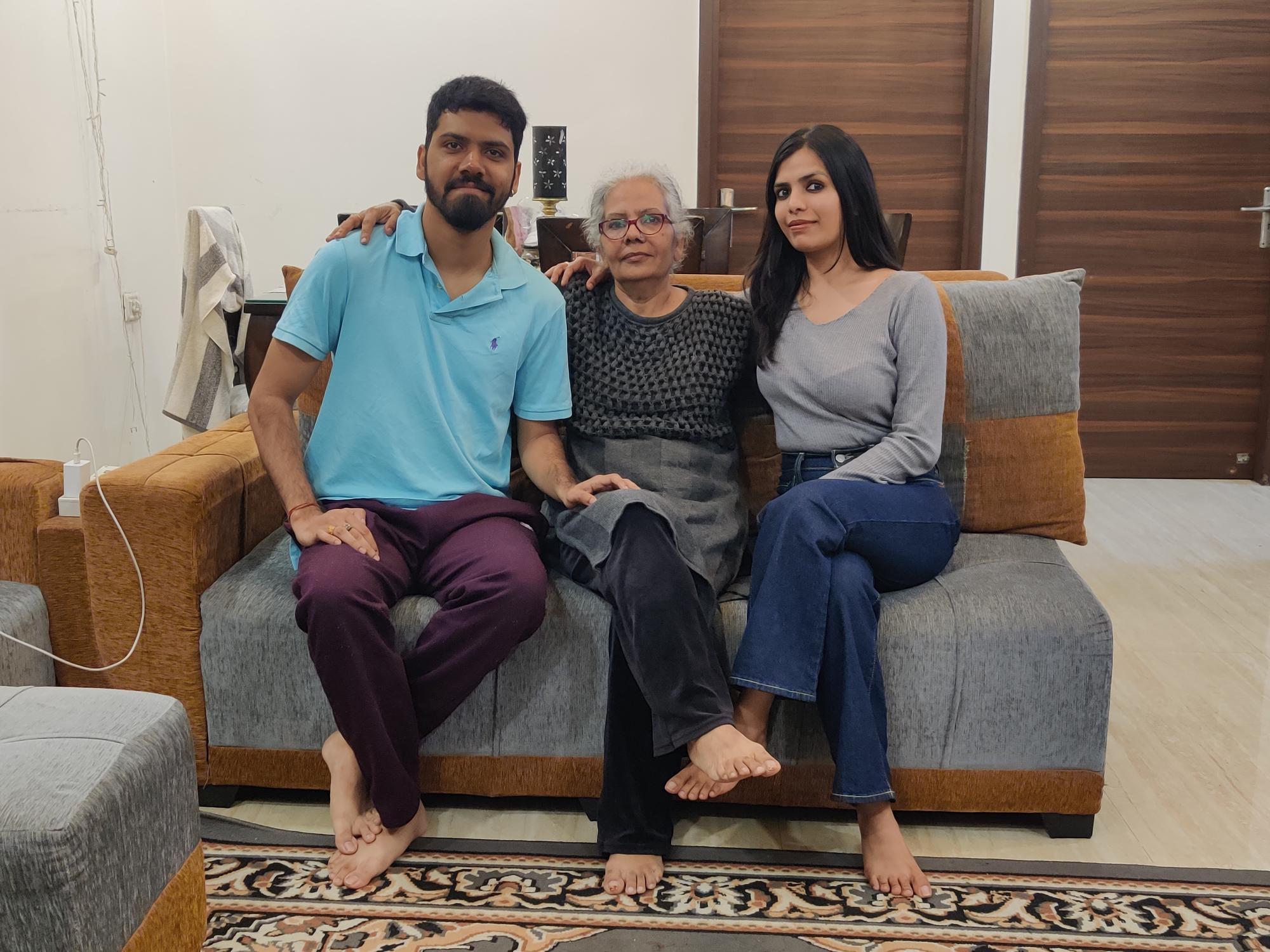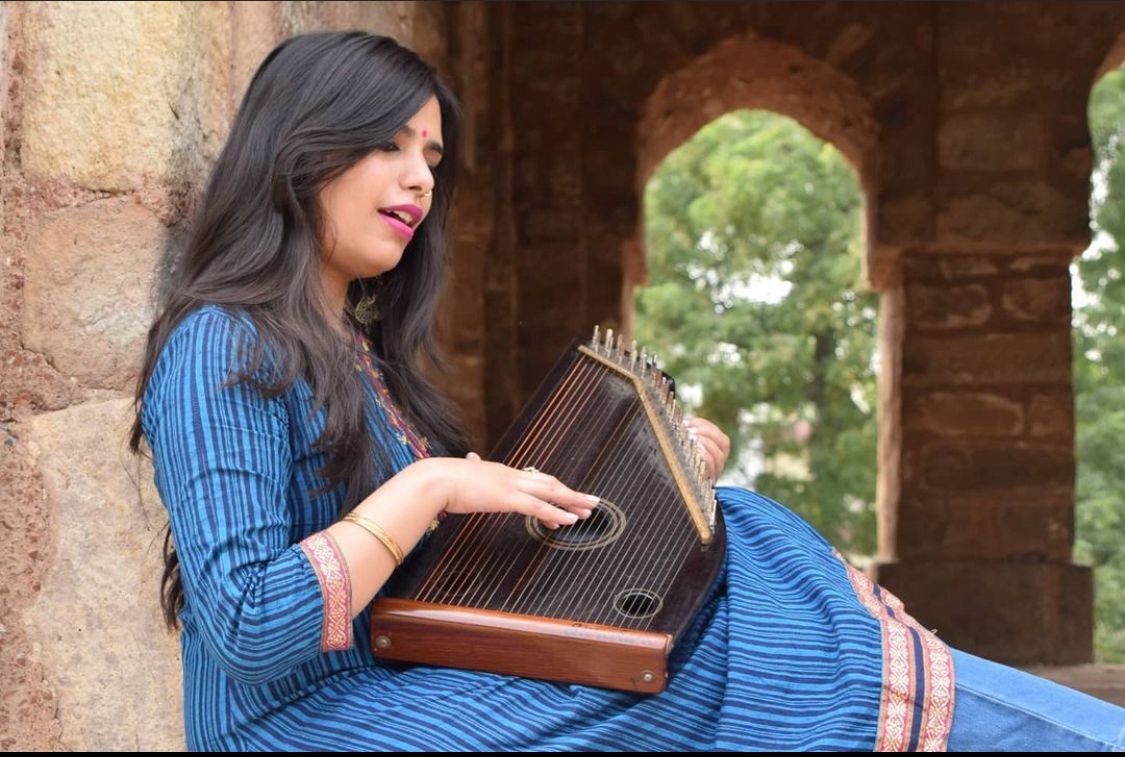
Tripti Nath/New Delhi
Hindustani classical vocalist Ghulam Hasan Khan’s home in South Delhi presents a unique example of inter-faith unity and talent. This is a family of three musicians- each professing a different religion, living together in harmony, and welcoming the first ray of the sun with their daily Riyaz.
Members of this family celebrate all major festivals including Holi, Diwali, Eid, and Christmas with equal zeal and fervour. Ghulam Hasan’s mother, Roma Abbas Khan is a Christian who is also a Ghazal singer, and his like-aged wife, Shivani Singh is a well-known Ghazal singer who is also enrolled for a Ph.D. at Delhi University. It was love for music that brought them together in 2016 and united them in matrimony three years later.
— Awaz-The Voice (@AwazThevoice) March 6, 2024
Both of them met while studying in the Faculty of Music at Delhi University. Ghulam smiles and recalls how he fell in love with her voice and beauty and proposed to her at a metro station. He still has initial messages sent to Shivani, on his mobile.
While Roma learnt music in the early 80s from Ustad Hafeez Ahmed Khan of Rampur Sahaswan Gharana, Shivani learned music from Pandit Bhola Nath Mishra of Banaras Gharana.
 Ghulam Hasan Khan with his mother and wife
Ghulam Hasan Khan with his mother and wife
His father’s grandfather, Ustad Ghulam Jafar Khan, was a Sarangi Nawaz (player) in Rampur Durbar.
Ghulam says that there are two music lineages in his family. Elaborating upon his rich heritage, he said, "I am from the lineage of Ustad Mushtaq Husain Khan. Ustad Inayat Husain Khan Sahab started the Rampur Sahaswan gharana and he used to learn fron Ustad Bahadur Husain Khan Sahab who was a Court musician in Gwalior and from the Gwalior gharana as welll. So, Rampur Sahaswan Gharana has emerged from the Gwalior Gharana. Ustad Inayat Husain Khan Sahab had two disciples - his son, Ustad Fida Husain Khan Sahab besides Mushtaq Husain Khan Sahab and Haider Khan Sahab.
"Ustad Fida Husain Khan Sahab was the father of Nisar Husain Khan Sahab. Ustad Inayat Husain Khan Sahab had asked Mushtaq Husain Khan Sahab to succeed him and my grandfather learned from him. What is interesting is that my mother learnt music in Delhi from Ustad Hafiz Ahmed Khan who was the first cousin of my paternal grandfather and a disciple of Ustad Nisar Husain Khan. I was fortunate to benefit from the tradition of Ustad Mushtaq Husain Khan as well as Ustad Nisar Husain Khan.''
Music has been an indispensable part of Ghulam’s life right from childhood. He recalls that while stepping out from home to go to school, he would hear his grandfather’s voice, the Tabla and the electronic Tanpura. “I was very lucky that my father, Ustad Ghulam Abbas Khan, a vocalist of international repute, initiated me into music at the tender age of four. I began learning from my paternal grandfather, Ustad Ghulam Sadiq Khan who was decorated with the Padma Shri and had very exacting standards. He was very strict. I remember that once while I was cycling in our neighbourhood in Asiad Games village, my mother lifted me and carried me to my grandfather's room for Riyaz. Classical music is like a regimen.''
Even as a child, Ghulam's grandfather would make him practice six hours a day. After all, he was one of the finest Hindustani classical vocalists of India. "I learnt very early that Indian classical music is a fine art and can be learnt only with discipline. My grandfather’s room was not just a room. It was like a Gharana. Even today, I practise for at least four and a half hours a day.''
Ghulam remembers that when his grandfather’s health did not allow him to teach his disciples, he would depute him to take his place.. Ghulam has so far taught at least 350 students. He has students coming to his house almost every day to learn and he also teaches music online to students in the U.S and the U.K.
Ghulam Hasan Khan and Shivani posing in front of the Padma Shri citation
He vividly remembers the day his grandfather introduced him at a concert organized by one of his disciples at the Poorvi Music Foundation Festival. It was in 2006. Ghulam Hasan Khan was only ten years old and he sang Raag Hamir. How his grandfather chose the time to introduce him on stage is also an interesting story. His disciple had come to request him to sing at the concert but he suggested that Ghulam would sing. “Mai chahta hun ki mai apne pote ka Bismillah kara dun’’ (I want to introduce him)- my grandfather told his disciple.''
Ghulam was not confident and refused in front of his grandfather's student. He told his grandfather that he was not ready but he was so persuasive. ''He first asked me to apologize to his disciple for refusing to sing and assured me that that he would teach me for the concert. My grandfather had a way of rewarding me when he felt I had sung well. I miss those times so much. I went ahead and performed with Ustad Mahmood Dholpuri who was a Padma Shri for harmonium. Tabla maestro Pandit Subhash Nirwan also played in that concert. Unfortunately, they are no more.''
After 2006, Ghulam has performed in at least 250 concerts in India and abroad. "I had set up a band also from 2012 to 2015 but my grandfather was not happy with it. He knew that I was cut out for Hindustani classical music and not for a band. He told me that after he was gone, nobody would teach me. I realize it now and regret it. My father knew that that there is a lot of financial struggle in Indian classical music and wanted me to earn some money for financial stability.''
When Ghulam sang a Bandish in Raag Hamir, I was stunned. His voice sounded like that of a very seasoned musician- not that of a young musician, But what saddens Ghulam is that it is difficult for Indian classical musicians to carry on with their passion as are not paid what they deserve. He says that his private tuition is what keeps him going.
He also laments the fact that some organizers request them to finish a concert in 45 minutes. "I think, an Indian classical vocalist can do full justice to a concert of at least two and a half hours. In 2022, I was invited by a family of music lovers to a family wedding. The concert lasted three and a half hours. I enjoyed singing many Ragas. It was very fulfilling. Perhaps Allah has given me the responsibility of continuing this music tradition. It helps me preserve the tradition of my Gharana, takes care of my bread and butter, and also gives me inner satisfaction.
"I consider myself very fortunate that I am born in such an illustrious family but I often hear my disciples complaining that their parents want to invest in their music tuition fee only for returns. The reality is different. In Indian classical music, you get Izzat (respect) and you get invited but people are not prepared to pay more than Rs 10,000 or Rs 12,000 for a concert. Whatever we earn is from tuition but in a full calendar year, the maximum that I can earn is Rs 50,000 from concerts. In Indian classical music, organizers only promote those in the limelight. Everything is dictated by lobbying not merit. There is a lot of exploitation.''
At present, Ghulam is teaching some 80 students including British and American students, who study online.
His mother, Roma sang from 1983 to 2009. As family responsibilities increased, Roma stopped singing in public. She remembers that when her father took her to Ustad Hafiz Khan in Nizamuddin (New Delhi), he said that she was already singing well.
It is surprising to see a young couple completely devoted to music and not getting carried away by several distractions or addictions of any kind. Ghulam explains, “I grew up in a joint family with solid middle-class values. The only thing we knew was tea time with biscuits, women folk watching soap operas on television peeling peas, and cutting vegetables. When I find time, I prefer to spend time only with my family. I love food. So, I like to go out to eat with my family members.''
Likewise, music is the center of Shivani’s universe. “Music is like Saadhna", she says.
 Shivani Singh singing a Ghazal to the accompaniment of the Swarmandal
Shivani Singh singing a Ghazal to the accompaniment of the Swarmandal
Shivani grew up in Faridabad, Haryana. It was in the DAV School in Sector 14, Faridabad that her Music teacher, Dr Anju Munjal recognized her talent. Shivani was an all-rounder; She learnt Bharatanatyam too. Her badminton coach was convinced that she was a promising player and could make it to the national level but Shivani’s heart was in music.
She had started singing when she was in Class III. The Music teacher in school also showed interest in her and then she began learning from her. She won many prizes for singing and was chosen as the Cultural Secretary in school.
In 2011 when Shivani was in Class XI, she decided to learn music from a Guru in East Delhi. She would change several modes of transport to commute nearly 40 kilometres from Faridabad to Laxmi Nagar in East Delhi to learn from Pandit Bhola Nath Mishra of the Benaras Gharana. “My parents would accompany me to my Guru's house. I would leave home at 6 a.m. and reach my Guru's house only around half past eight. I learnt Hindustani vocal, Thumri, Dadra, and Bhajans from my Guru.’’
After completing her B.Com (Honours) from Sri Venkateswara College, Shivani enrolled for postgraduation in Music and later did her M. Phil in Music.
Shivani who also teaches Ghazal to students says that her husband is an inspiration for the younger generation of musicians.
She says that Ghazal singers are more in demand compared to Indian classical music. "Ghazals fall in the category of light music. They are very much a part of Hindi cinema and also have a global appeal. Indian classical music has a limited audience and therefore its demand is limited. Not everybody is inclined to classical music.''
Shivani says she is very happy to have married into a truly secular family. "Initially, my family had apprehensions that I may have to change my name but I had no such pressure in my matrimonial home. I enjoy complete religious freedom and do Diwali Pooja and Saraswati Pooja in which my husband and in-laws participate.''
ALSO READ: Violinist Ustad Asghar Hussain’s unforgettable moments with PM Modi, Putin
Both Ghulam and Shivani are graded artists of All India Radio. Ghulam is also on the panel of the Indian Council for Cultural Relations (ICCR), the cultural arm of the Ministry of External Affairs. Although Ghulam has lost count of the concerts he participated in, he says that both of them may have sung in at least 250 concerts so far.
Their most recent performance was at the Aaroga Fair in Nehru Stadium in Delhi.
